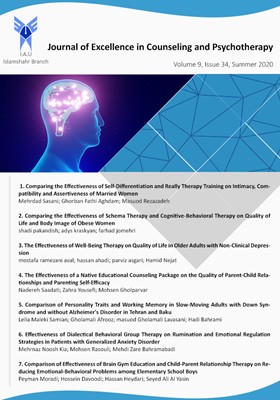Comparison of Effectiveness of Brain Gym Education and Child-Parent Relationship Therapy on Reducing Emotional-Behavioral Problems among Elementary School Boys
Subject Areas : Journal of Excellence in Counseling and PsychotherapyPeyman Moradi 1 , Hossein Davoodi 2 * , Hassan Heydari 3 , Seyed Ali Al Yasin 4
1 - PhD Student, Department of Psychology, Faculty of Humanities, Khomein Branch, Islamic Azad University, Khomein, Iran
2 - Assistant Professor, Department of Counseling, Faculty of Humanities, Khomein Branch, Islamic Azad University, Khomein, Iran
3 - Associate Professor, Department of Counseling, Faculty of Humanities, Khomein Branch, Islamic Azad University, Khomein, Iran
4 - Assistant Professor, Department of Clinical Psychology, Faculty of Humanities, Ashtian Branch, Islamic Azad University, Ashtian, Iran
Keywords: behavioral problems, Child Therapy, Brain Gym,
Abstract :
Purpose: Studies show that the prevalence of emotional-behavioral problems in primary school students was high, which can lead to many complications and problems for them and their families. Therefore, the aim of this study was to compare the effectiveness of brain gym education and child –parent relationship therapy on reducing emotional-behavioral problems in primary school male students. Methodology: The research was quasi-experimental with a pretest-posttest design with a control group and a two-month follow-up. The statistical population included all 7-11 year old male students studying in primary school in Gorgan. Using the available method, 30 students who scored high on the Rutter Behavioral Problems Questionnaire (Form A) were selected and assigned to three equal groups of 10 people. For the brain gym group, 8 1-hour sessions were performed once a week, and for the pediatric therapy group, 10 1.5 hour sessions were performed once a week, but the control group did not receive any intervention. Data analysis was performed by descriptive statistics and one-way covariance with repeated measures with SPSS version 22. Findings: The results showed that in the post-test stage, there was a statistically significant difference between the mean scores of aggression, depression, anxiety and maladaptation in the subjects of the three groups (p < 0.05). Also, the results showed that in the two-month follow-up phase, this effect was stable and the effect of brain gym on reducing the dimensions of emotional-behavioral problems was more effective than child therapy based on the parent-child relationship (p < 0.05). Discussion: According to the results of the present study, it can be concluded that parents' brain gym training program and child therapy are effective strategies to reduce children's emotional-behavioral problems. Based on the results of this study, counselors and child psychologists are suggested to try to reduce children's emotional-behavioral problems by using these educational programs.
_||_

